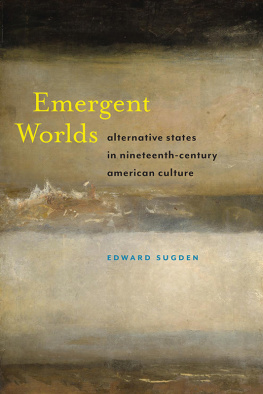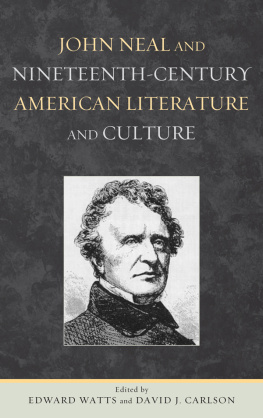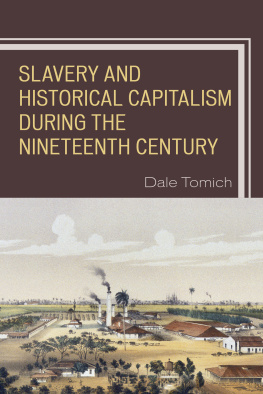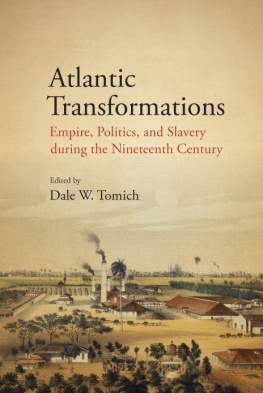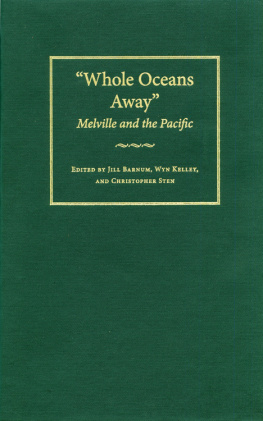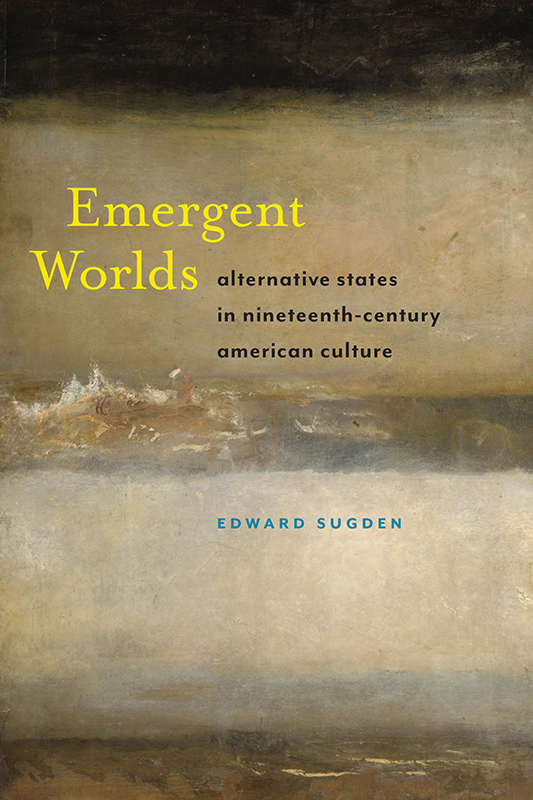
Emergent Worlds
America and the Long 19th Century
General Editors: David Kazanjian, Elizabeth McHenry, and Priscilla Wald
Black Frankenstein: The Making of an American Metaphor
Elizabeth Young
Neither Fugitive nor Free: Atlantic Slavery, Freedom Suits, and the Legal Culture of Travel
Edlie L. Wong
Shadowing the White Mans Burden: U.S. Imperialism and the Problem of the Color Line
Gretchen Murphy
Bodies of Reform: The Rhetoric of Character in Gilded Age America
James B. Salazar
Empires Proxy: American Literature and U.S. Imperialism in the Philippines
Meg Wesling
Sites Unseen: Architecture, Race, and American Literature
William A. Gleason
Racial Innocence: Performing American Childhood from Slavery to Civil Rights
Robin Bernstein
American Arabesque: Arabs and Islam in the Nineteenth-Century Imaginary
Jacob Rama Berman
Racial Indigestion: Eating Bodies in the Nineteenth Century
Kyla Wazana Tompkins
Idle Threats: Men and the Limits of Productivity in Nineteenth-Century America
Andrew Lyndon Knighton
Tomorrows Parties: Sex and the Untimely in Nineteenth-Century America
Peter M. Coviello
Bonds of Citizenship: Law and the Labors of Emancipation
Hoang Gia Phan
The Traumatic Colonel: The Founding Fathers, Slavery, and the Phantasmatic Aaron Burr
Michael J. Drexler and Ed White
Unsettled States: Nineteenth-Century American Literary Studies
Edited by Dana Luciano and Ivy G. Wilson
Sitting in Darkness: Mark Twains Asia and Comparative Racialization
Hsuan L. Hsu
Picture Freedom: Remaking Black Visuality in the Early Nineteenth Century
Jasmine Nichole Cobb
Stella
meric Bergeaud
Translated by Lesley Curtis and Christen Mucher
Racial Reconstruction: Black Inclusion, Chinese Exclusion, and the Fictions of Citizenship
Edlie L. Wong
Ethnology and Empire: Languages, Literature, and the Making of the North American Borderlands
Robert Lawrence Gunn
The Black Radical Tragic: Performance, Aesthetics, and the Unfinished Haitian Revolution
Jeremy Matthew Glick
Undisciplined: Science, Ethnography, and Personhood in the Americas, 18301940
Nihad M. Farooq
The Latino Nineteenth Century
Edited by Rodrigo Lazo and Jesse Alemn
Fugitive Science: Empiricism and Freedom in Early African American Culture
Britt Rusert
Before Chicano: Citizenship and the Making of Mexican American Manhood, 18481959
Alberto Varon
Emergent Worlds: Alternative States in Nineteenth-Century American Culture
Edward Sugden
Emergent Worlds
Alternative States in Nineteenth-Century American Culture
Edward Sugden

NEW YORK UNIVERSITY PRESS
New York
NEW YORK UNIVERSITY PRESS
New York
www.nyupress.org
2018 by New York University
All rights reserved
References to Internet websites (URLs) were accurate at the time of writing. Neither the author nor New York University Press is responsible for URLs that may have expired or changed since the manuscript was prepared.
Library of Congress Cataloging-in-Publication Data
Names: Sugden, Edward (Edward Alexander), 1986 author.
Title: Emergent worlds : alternative states in nineteenth-century American culture / Edward Sugden.
Description: New York : New York University Press, 2018. | Series: America and the long 19th century | Includes bibliographical references and index.
Identifiers: LCCN | ISBN 9781479899692 (cl : alk. paper) | ISBN 9781479889266 (pb : alk. paper)
Subjects: LCSH : American literature19th centuryHistory and criticism. | Social change in literature. | Literature and historyUnited States. | Melville, Herman, 18191891Political and social views. | AmericaHistory19th century. | Social changeHistory19th century. | Political cultureHistory19th century.
Classification: LCC PS217.S58 S84 2018 | DDC 810.9/003dc23
LC record available at https://lccn.loc.gov/2017060984
New York University Press books are printed on acid-free paper, and their binding materials are chosen for strength and durability. We strive to use environmentally responsible suppliers and materials to the greatest extent possible in publishing our books.
Manufactured in the United States of America
10 9 8 7 6 5 4 3 2 1
Also available as an ebook
Contents
Interstitial States in the Oceanic Nineteenth Century
The Brief Interlude
Call me Ishmael.
However, it is the second sentence, or at least the start of it, that has always drawn me in, in spite of it not receiving anywhere near like the same critical attention: Some years agonever mind how long preciselyhaving little or no money in my purse, and nothing particular to interest me on shore, I thought I would sail about a little and see the watery part of the world (3). Some years agonever mind how long precisely... The phrase can pass one by as the paragraph establishes its ebbing, symphonic rhythm, with its references to classical history and subconscious instinct, but it nonetheless stands out to me. It has When placed against this larger context, there appears to be an awful lot at stake in Melvilles misdirection as he points us away from asking when it was that the voyage took place. On this basis, I suspected that these two clauses, although offhand, would grant us a gateway into a conceptual universe every bit as deep as the equally blandly equivocal opening sentence.
And so it proved: this sentence ultimately was the seed out of which this work grew, raising the issues of historical framing, geographical placement, elusive politics, time consciousness, and the roots of a series of alternative, internationalist genres that crystallized into a cogent organization in the 1850s with which it is concerned. It now appears to me that we can find in this sentence a concentrated, compacted gesture toward the definitional crisis that has engulfed the study of the US Americas, and, as a subset of this field, nineteenth-century American literature, insofar as such a thing exists, in the last fifteen years. It forces us to ask what the whens, wheres, whats, and whos of these fields of study are and the social relationship of the imagination to these same questions. But I am getting ahead of myself: let us return to the text and see what else it might tell us. Melville actually gives us the answer to how many years ago precisely it was that Ishmael went to sea reasonably soon after this sentence, before, indeed, the close of the first chapter. Yet the answer he gives is less important than the terms in which he frames it:
And, doubtless, my going on this whaling voyage, formed part of the grand programme of Providence that was drawn up a long time ago. It came in as a sort of brief interlude and solo between more extensive performances. I take it that this part of the bill must have run something like this:
- Grand Contested Election for the Presidency of the United States.
- WHALING VOYAGE BY ONE ISHMAEL .
- BLOODY BATTLE IN AFFGHANISTAN . (7)
This framework would place Ishmaels adventure at some point in the late 1830s or early 1840sor, not without some significance, as we will see in the conclusion, sometime between 1999 and 2003. However, I am more interested inand indeed think that the novel is more interested inthe tantalizing phrase embedded there, the brief interlude that for him characterizes the relationship between Ishmaels voyage and history and, by extension,
Next page
